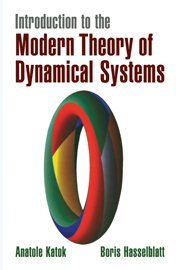Book contents
- Frontmatter
- Contents
- PREFACE
- 0 INTRODUCTION
- Part 1 Examples and fundamental concepts
- Part 2 Local analysis and orbit growth
- Part 3 Low-dimensional phenomena
- Part 4 Hyperbolic dynamical systems
- 17 SURVEY OF EXAMPLES
- 18 TOPOLOGICAL PROPERTIES OF HYPERBOLIC SETS
- 19 METRIC STRUCTURE OF HYPERBOLIC SETS
- 20 EQUILIBRIUM STATES AND SMOOTH INVARIANT MEASURES
- 21 Supplement: DYNAMICAL SYSTEMS WITH NONUNIFORMLY HYPERBOLIC BEHAVIOR BY ANATOLE KATOK AND LEONARDO MENDOZA
- Appendix: BACKGROUND MATERIAL
- NOTES
- HINTS AND ANSWERS TO THE EXERCISES
- REFERENCES
- INDEX
20 - EQUILIBRIUM STATES AND SMOOTH INVARIANT MEASURES
Published online by Cambridge University Press: 05 June 2012
- Frontmatter
- Contents
- PREFACE
- 0 INTRODUCTION
- Part 1 Examples and fundamental concepts
- Part 2 Local analysis and orbit growth
- Part 3 Low-dimensional phenomena
- Part 4 Hyperbolic dynamical systems
- 17 SURVEY OF EXAMPLES
- 18 TOPOLOGICAL PROPERTIES OF HYPERBOLIC SETS
- 19 METRIC STRUCTURE OF HYPERBOLIC SETS
- 20 EQUILIBRIUM STATES AND SMOOTH INVARIANT MEASURES
- 21 Supplement: DYNAMICAL SYSTEMS WITH NONUNIFORMLY HYPERBOLIC BEHAVIOR BY ANATOLE KATOK AND LEONARDO MENDOZA
- Appendix: BACKGROUND MATERIAL
- NOTES
- HINTS AND ANSWERS TO THE EXERCISES
- REFERENCES
- INDEX
Summary
In this chapter we describe some of the principal results in the ergodic theory of hyperbolic dynamical systems. There are two distinguished kinds of invariant measures for a smooth dynamical system: Measures with maximal entropy and smooth measures. We will see that for hyperbolic systems these measures are particular cases of equilibrium states, which are counterparts of Gibbs measures in statistical mechanics. The first four sections are dedicated to the study of equilibrium states, with particular emphasis on those distinguished measures, and complete the line of development from Chapters 18 and 19. The two key tools are specification and the Livschitz Theorem.
The final two sections have a somewhat distinct character. Our aim there is to obtain a multiplicative asymptotic of the growth of closed orbits for topologically mixing Anosov flows, and hence a similar asymptotic for the number of closed geodesics on a compact Riemannian manifold of negative sectional curvature, following the original approach of Margulis. It is based on an alternative description of the measure of maximal entropy which we give in Section 5. In Section 6 we derive the multiplicative asymptotic following the doctoral thesis of Toll. Neither the original proof by Margulis nor that of Toll were ever published.
Bowen measure
The Variational Principle (Theorem 4.5.3) asserts that topological entropy is the supremum of metric entropies. We observed also that for expansive maps the supremum is indeed attained (Theorem 4.5.4). Thus it is natural to try to investigate those preferred measures whose entropy is maximal.
- Type
- Chapter
- Information
- Introduction to the Modern Theory of Dynamical Systems , pp. 615 - 656Publisher: Cambridge University PressPrint publication year: 1995



